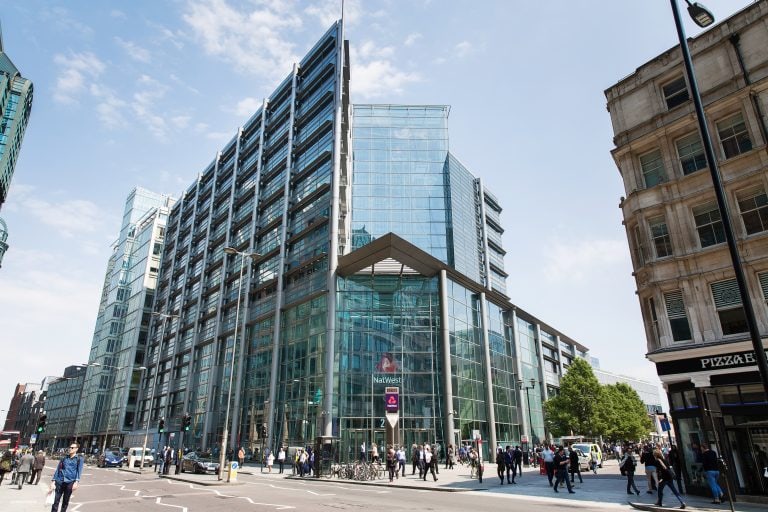Banking on net zero buildings

In February 2020, NatWest Group put climate action front-and-centre of the bank’s purpose – recognising the climate challenge, the need for a transition to a low carbon economy and the unique role that the bank will play in facilitating this transition.
Championing climate solutions
The bank is a leading lender to UK renewables sector by number of transactions in the past decade (2009-2019)[1] and has provided £9.9bn to sustainable energy funding and financing provided to the sustainable energy sector between 2018-20 (£10bn target substantively met one year early). We have since committed to an additional £20bn of funding and financing for Climate and Sustainable Finance between now and 2022, you can find our inclusion criteria here.
Focus on our operational footprint
On the 11th December 2020, NatWest Group became a signatory to the World Green Building Council’s (WGBC) Net Zero Carbon Buildings Commitment – announced at a UKGBC event to mark five years since the historic Paris Agreement on climate action was signed.
Becoming a signatory to this commitment builds upon and compliments the bank’s existing targets to have net zero carbon operations in 2020 and climate positive by 2025, through a further 25% reduction in carbon emissions.
NatWest Group was also the first bank globally to sign up to all three of The Climate Group’s carbon reduction initiatives – RE100, EV100 and EP100 – in 2019.
We understand and acknowledge that across our operations, the single largest environmental impact (scopes 1 & 2) comes from the emissions arising from our buildings – the offices, branches, data centres and other properties that we own and occupy.
When we first became aware of WGBC’s Net Zero Carbon Buildings Commitment and started to research it, we felt that the bank had either already made related commitments or was already taking action in key areas under the Commitment. For example, in the management of our own estate we have dedicated workstreams looking at energy efficiency (EP100), on-site and off-site renewable electricity generation opportunities (RE100) and electric vehicles (EV100).
So, our rationale behind seeking to be an early adopter of the WGBC’s Net Zero Carbon Buildings Commitment is that it provides an overarching ambition and framework to support our existing efforts in our buildings, as well as the targeted efforts we are making relating to the RE100, EV100 and EP100 programmes.
We recognise that designing out carbon in our buildings means making the right decisions throughout the bank’s tenure of the building – from the initial decision on building choice, through to sustainable and low carbon design when fitting-out new (or retrofitting existing) buildings, through to the efficient management of resources used during the in-use phase of the building.
Advocating for change
We also acknowledge the unique role we play in advocating for climate action through our lending practices and the financial products we offer. UKGBC’s, WGBC’s, and the bank’s advocacy goals are well aligned and, as a signatory to the commitment and principal sponsor for the COP26 climate summit, the bank will continue to engage and collaborate with government, businesses, regulators and society, and the key role of the finance sector to support the transition to a low carbon economy.
[1] Inframation Deals League Table
Related
Navigating the challenges around hard-to-recycle materials

What are the environmental impacts of construction materials? An introduction to Embodied Ecological Impacts

Why is social value so crucial when developing and managing commercial real estate?

Biodiversity Net Gain: Are you ready for the incoming legislation?

